Are Your Employees Slacking Off? What to Look For and How to Stop It

Slacking off at work seems so easy nowadays, we got that video of the cute, little parrot throwing everything from the kitchen counter, the birth of a new meme every single week, and wait! Did Billie Eilish change her hair color again? Ah! Distractions are just everywhere.
Yes, we can find a million and one things to distract us during work hours, but it doesn’t mean we have to allow it, and even less to hinder our work performance. There is nothing more disagreeable than employees who just can’t seem to stay on task! Yet, there are solutions to improve these challenges. In this blog post, we will discuss why employees slack off at work and what you can do to prevent it.
Keep reading!
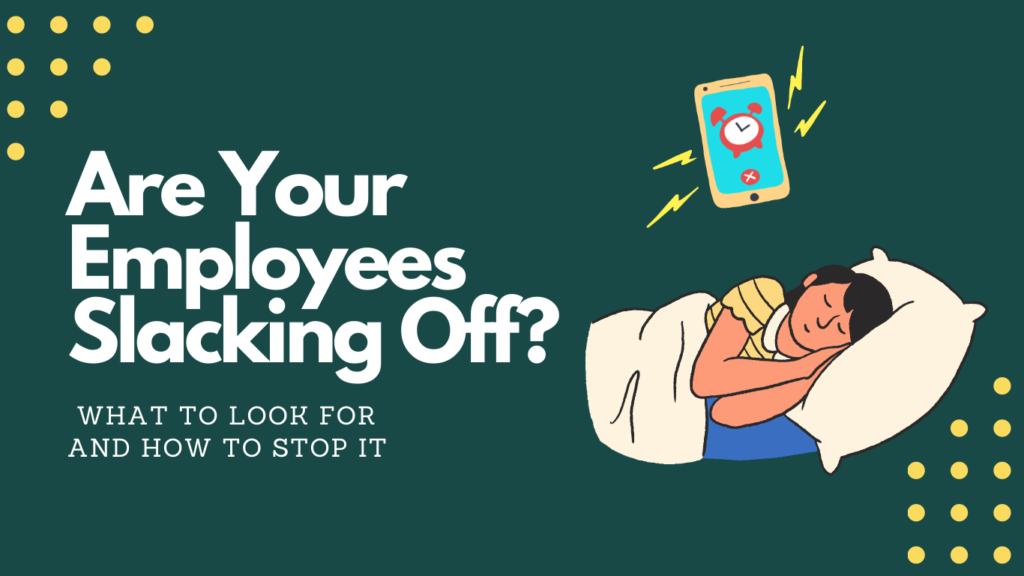
According to Zippia, the average American worker wastes 2.9 hours each day during work by partaking in non-work activities, including browsing the internet, checking social media sites, and texting. That’s nearly 20% of an employee’s day! And, out of all the generations in the workforce, millennials are slacking off the most.

Slacking off at work is when an employee is not working to their full potential. This can mean different things for different people, but generally, it includes not putting in the effort to complete tasks or taking frequent breaks
Yet, other stats show that professionals spend nearly half of their “normal 40-hour workday” (21.5 hours) in meetings each week. Since February 2020, people have spent 7.3 hours more in meetings than they did before when weekly meetings only lasted an average of 14.2 hours.
This leads us to ask: How much responsibility does a company have on the slack off of an employee?
Keep reading to find out!
Why Your Employees Are Slacking Off?
Trying to find out why your employees are slacking off can be tricky. It can be easy to point the finger and say “lazy” or “unmotivated,” but it’s important to remember that employees are human beings with different backgrounds, motivations, and challenges.
There could be several reasons why employees are slacking off at work, but here are some of the most common ones:
- They’re bored: If employees don’t feel challenged or like they’re learning anything new, they can start to feel bored at work. This is especially true for millennials who thrive on change and new experiences.
- They’re not engaged: According to Gallup, only 13% of employees worldwide are engaged at work. This means that a whopping 87% of employees are not engaged, which can lead to slacking off. When employees are not engaged, they’re less likely to care about their work and the company’s success.
- They don’t see the point: If employees don’t feel like their work is meaningful or makes a difference, they can start to wonder why they’re doing it in the first place. This can be a major problem for companies that haven’t clearly defined their purpose or mission.
- They’re stressed: According to the American Institute of Stress, 80% of workers feel stress on the job, and 40% say their job is very or extremely stressful. It’s no surprise then that employees who are constantly stressed out.
- They’re not motivated: Finally, employees can start to slack off if they don’t feel motivated to do their best work. This could be because of a lack of recognition or appreciation from their managers or because they don’t feel like their work is valued.

However, it could also be because as a manager or an employer:
- You are giving orders, not involving the team: Telling employees what to do without involving them in the decision-making process can make them feel like their opinions don’t matter. As a result, they may start to disengage from their work.
- You are not providing adequate training: If employees don’t feel like they have the skills or knowledge to do their jobs properly, they can start to feel overwhelmed and stressed. This can lead to them making mistakes or taking longer to complete tasks.
- You are not setting clear expectations: Employees need to know what is expected of them to meet those expectations. If you’re not clear about what you want employees to do, they can start to second-guess themselves and their work.
- Creating a negative work environment: If you want employees who are fully engaged and motivated, it’s important to create a positive work environment where they feel valued and appreciated.
Get more out of your business
Get the best employee engagement content every week via mailing list
Key Employee Slacking Off Indicators
There are some key indicators that employees are slacking off. If you’re seeing any of these signs, it’s time to have a conversation with your employees:
- Decrease in productivity: This can be measured by looking at things like the number of tasks completed, sales numbers, or how long it takes to complete a task.
- Increase in mistakes: If employees are making more mistakes than usual, it could be because they’re rushing through their work or not paying attention to detail.
- A decrease in quality: If the quality of employees’ work is declining, it could be because they’re cutting corners or not putting in the effort they used to.
- More absences: If employees are taking more sick days, personal days, or vacation days, it could be a sign that they’re trying to avoid coming to work.
- An increase in tardiness: If employees are regularly coming in late or leaving early.
- Lack of motivation: If employees seem less motivated or enthusiastic about their work, it could be a sign that they’re slacking off.
Ways to Stop Employees from Slacking Off
If you’re seeing any signs that employees are slacking off, it’s important to take action. Here are some ways to stop employees from slacking off:
Assign Meaningful Work
Having a purpose is a powerful motivator. Meaningful work is work that is interesting, challenging, and has a purpose. When employees see the value in their work, they’re more likely to be engaged and motivated.
When employees feel like their work is meaningful and makes a difference, they’re more likely to be engaged and motivated
As a result, they’re less likely to slack off and more likely to be productive. Meaningful work is essential for a thriving business. It’s what keeps employees engaged and motivated, and it’s what drives productivity.
Check-In
No one likes to be micromanaged, but when it comes to slacking off at work, a little bit of supervision can go a long way. If you find that your employees are starting to slack off, consider implementing a check-In system.
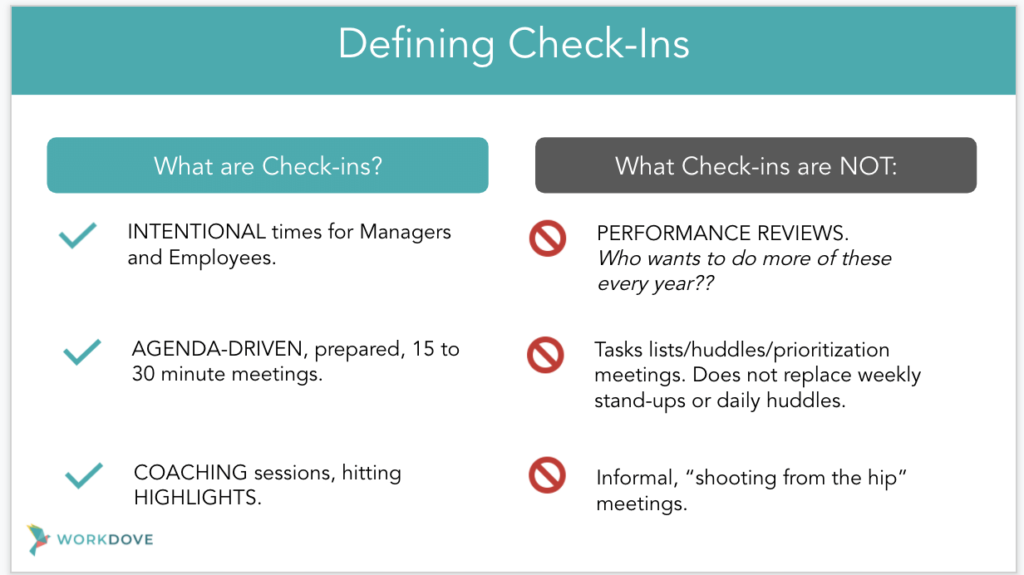
This is an opportunity for employees to ask questions, voice concerns, and give suggestions. It’s also a chance for managers to identify any issues that might be causing employees to slack off.
Managers should check in with employees regularly to see how they’re doing and to provide feedback
This can be as simple as requiring employees to check in with you at the beginning of each day, or it can involve more frequent check-ins throughout the day. The important thing is that you make it clear that you are paying attention to their work habits and that slacking off will not be tolerated.
Make Sure Employees Have the Training and Resources They Need
One of the most important things is to make sure they have the training and resources they need. If they don’t know how to do their job properly, they can start to feel overwhelmed and stressed. This can lead to them making mistakes or taking longer to complete tasks.
If employees don’t have the resources they need, they’ll also be more likely to slack off
Make sure employees have the skills and knowledge they need to do their jobs properly by providing adequate training. This will help employees feel confident and motivated, and less likely to make mistakes or slack off.
Set Clear Expectations
According to Gallup, approximately just half of all employees firmly agree that they are aware of their obligations at work!
Employees who know what is expected of them are more likely to meet or exceed those expectations. Conversely, employees who are unclear about their duties and responsibilities are more likely to slacker off.
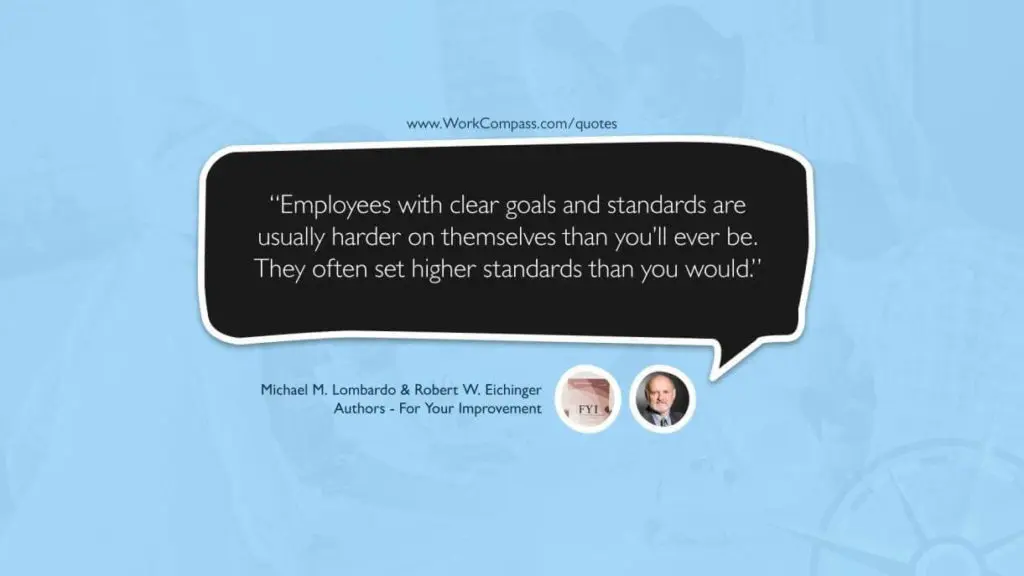
When setting expectations, be sure to be clear, concise, and specific. Vague instructions or goals will only lead to frustration and confusion. If possible, provide examples of what you expect employees to do. Look below for some tips!

And remember, it is always better to over-communicate than under-communicate!
Appreciate Employees’ Work
When employees feel appreciated, they’re more likely to be engaged and motivated. Appreciation can come in many forms, such as verbal praise, written feedback, or awards and recognition.
Thank employees for a job well done, and let them know that you appreciate their hard work. This simple act can go a long way in motivating employees and keeping them engaged.
Check our blog post on the best employee appreciation gifts here.
Lead by Example
As the saying goes, “actions speak louder than words.” As a manager, it’s important to lead by example and set the standard for employees. If you want employees to be productive and engaged, you need to model that behavior yourself.
When employees see their managers working hard and being held accountable, they’re more likely to do the same. On the other hand, if employees see their managers slacking off or cutting corners, they’re more likely to follow suit.
The bottom line is that employees will mirror your behavior, so make sure you’re setting a good example!
Address Performance Issues Early
If you notice an employee is starting to slack off, don’t wait until their performance suffers irremediably! The key to nipping slacking in the bud is to address the issue as soon as you see it happening. The sooner you address the issue, the easier it will be to get employees back on track.
If you wait too long, employees may start to develop bad habits that are difficult to break. Additionally, addressing performance issues early will help prevent them from getting worse and impacting other employees. Follow the below process for a healthy approach to the issue!
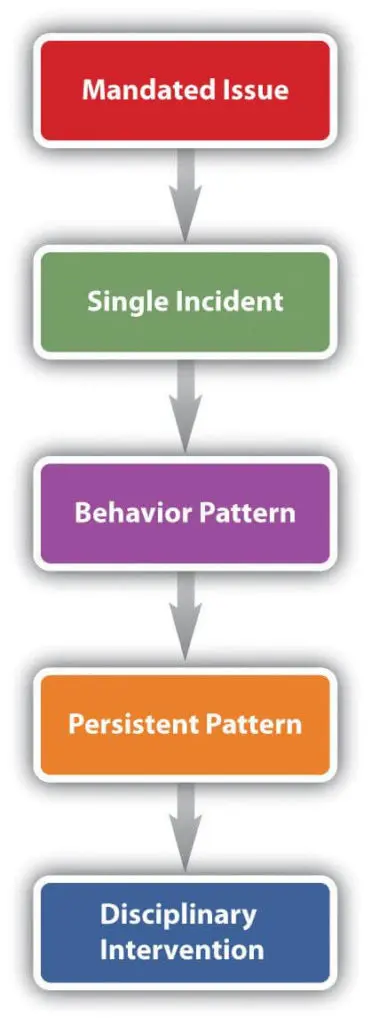
When addressing an employee’s poor performance, be sure to be clear about what needs to be improved and why, as well as explain how their behavior is impacting the team and offer suggestions for how they can improve. Finally, let them know what the consequences will be if their performance doesn’t improve.
Hold Employees Accountable
Explaining consequences for employees who don’t meet expectations is an important part of holding them accountable. Without consequences, employees may not see the need to change their behavior.
Consequences can range from verbal warnings to written warnings to suspensions or even termination. The type of consequence will depend on the severity of the issue and the employee’s past performance.
Creating a Positive Work Environment
A positive work environment is crucial for employees to feel engaged and motivated. When employees feel valued and supported, they’re more likely to be productive.
There are many ways to create a positive work environment, such as investing in employee development, offering flexible work arrangements, or providing recognition and appreciation.
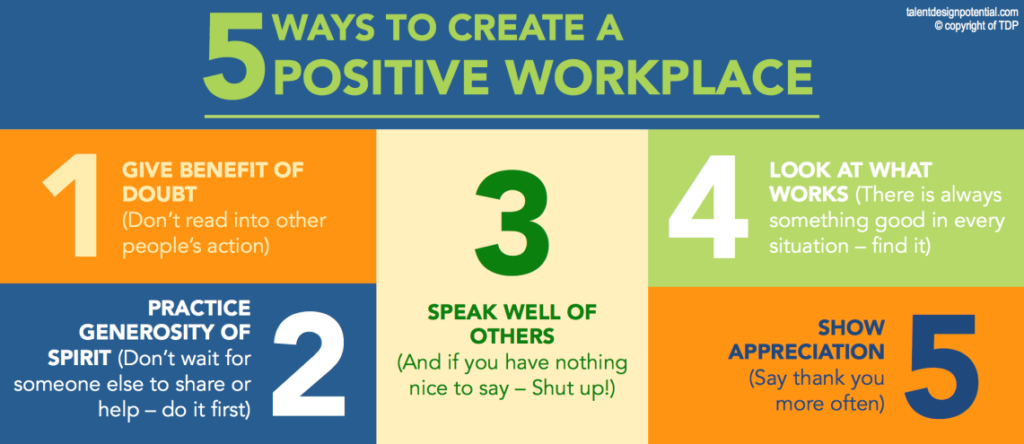
One way to appreciate employees is through verbal praise. Another way to show employees you care is by providing flexible work arrangements. For example, if an employee has young children, offer the option to telecommute a couple of days a week so they can save on daycare.
Making small changes to create a positive work environment can make a big difference in employees’ motivation and engagement.
Be Understanding
When employees are slacking off, it can be frustrating. However, it is important to remember that employees are human beings with their own unique set of circumstances.
Before taking disciplinary action, try to understand why employees are slacking off. Are they struggling with a personal issue? Do they feel like their work isn’t meaningful? Once you understand the root cause of the problem, you’ll be in a better position to address it.
Final Thoughts
It’s important to remember that, as an employer, you have a lot of power when it comes to motivating your employees. Offering incentives for good work and setting attainable goals with rewards are two great ways to get started to avoid your employees to slack off!
If you find that one of your employees is starting to slack off, don’t hesitate to coach them, and support them. Remember, positive reinforcement always works better than punishment. What know more methods to motivate your employees? Follow our blog!
-The Monitask Team


